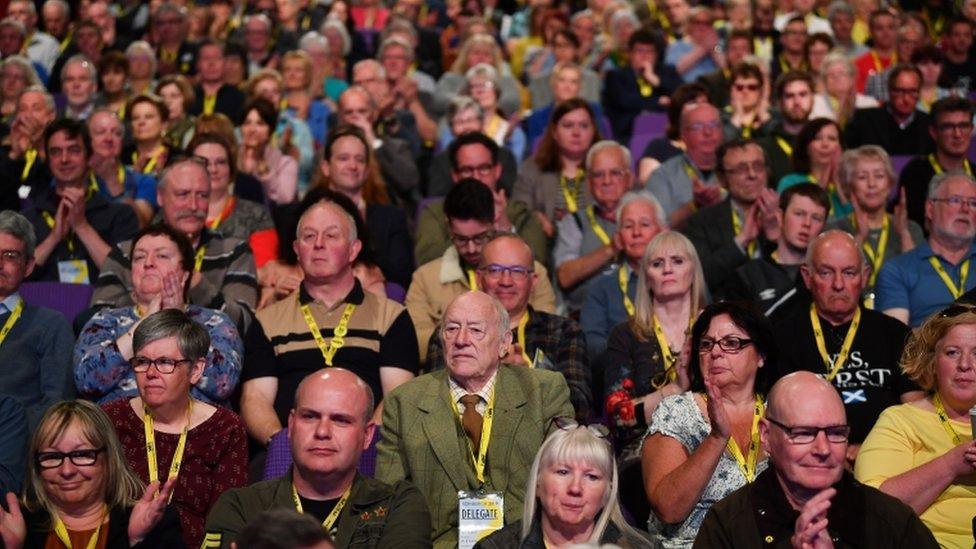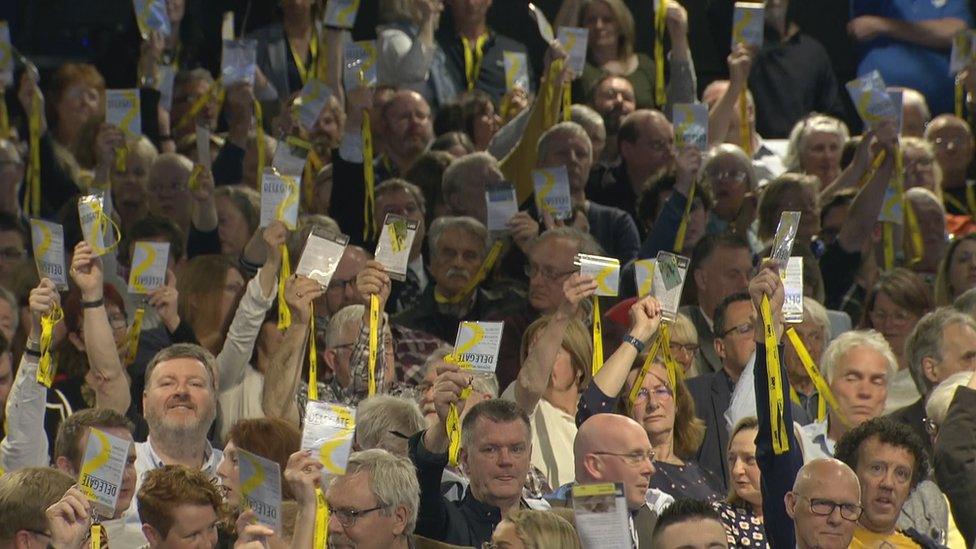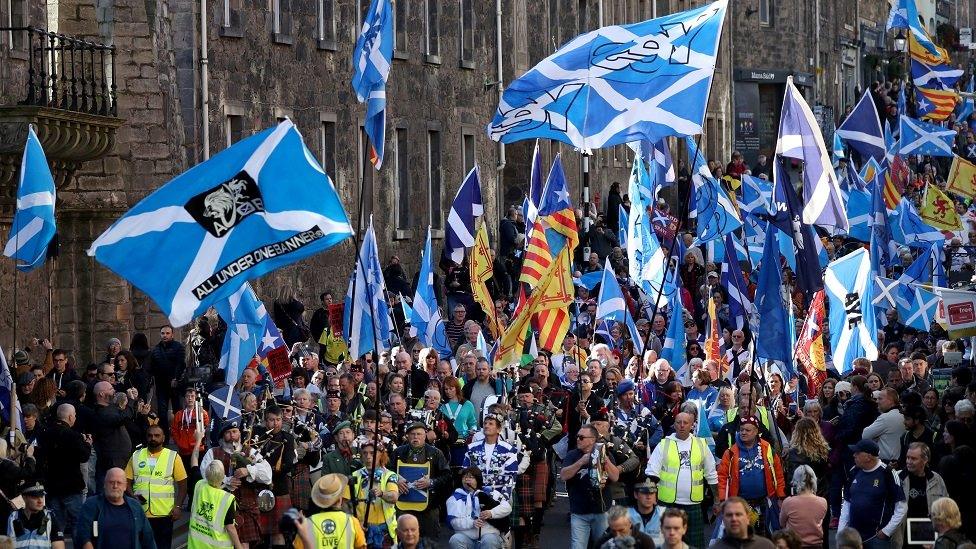What does the SNP's currency vote mean?
- Published

SNP delegates narrowly defeated their party's leaders over the timetable for switching currency
The SNP's currency plans for an independent Scotland have been approved by its party conference - although grassroots members forced changes to the leadership's original proposals.
So how significant were these changes, and what does it all mean for the independence movement?
What's this all about?
With one eye on a future independence referendum, the SNP has been working on its economic arguments - including those around currency, which became a major issue ahead of the first referendum in 2014.
To that end, former SNP MSP Andrew Wilson was tasked with heading a Growth Commission to put together a prospectus of economic arguments.
His proposal - heartily embraced by the party's leadership - was that an independent Scotland should retain the pound initially, before shifting to a new Scottish currency if and when six stringent economic tests were met.
Mr Wilson initially said it could take up to a decade for one of these tests - a manageable budget deficit - to be met. His aim was to offer a medium-term assurance to people over things like mortgages, pensions and investments.
After SNP members held a series of National Assembly meetings, the version which ultimately ended up being put to the party's conference in Edinburgh said an independent Scottish Parliament should take a decision on whether to establish a new currency by the end of its first term.
So the party leadership might have made a subtle shift there already - but some delegates came to conference looking for more.
So what happened at conference?

Delegates voted on a series of amendments to the leadership's economic plans
To start with, the currency plan passed. That's not an insignificant detail in itself; the SNP's official policy is now, for the first time, to move on from the pound post-independence.
That is a big change from 2014, when the Yes campaign headed by then-First Minister Alex Salmond proposed keeping the pound in a formal currency union with the rest of the UK - which was ruled out by Westminster.
The other story from conference was the debate, and the amendments put forward by members.
The leadership really wanted to get these plans past the conference. Deputy leader Keith Brown was visibly nervous putting them forward, and he was followed by a whole series of speakers who came forward to voice concerns.
There were worries about leaving monetary policy in the hands of the Bank of England after independence, and about how easy the plan would be to sell to voters.
Ministers and party veterans tried to offer reassurance, urging delegates to vote down the four amendments and leave the leadership's original motion unchanged.
In the end, three of these amendments were substantially defeated. But after a lengthy count of cards, a fourth was passed by a narrow margin of 52 votes.
This was perhaps the most minor amendment proposed. It only changed one paragraph, and committed the party to introduce a new Scottish corrency "as soon as practicable" after independence.
The party leadership insist that this is fine, and that Nothing Has Changed. Are they just putting a brave face on it, or will there be a real impact?
Allow X content?
This article contains content provided by X. We ask for your permission before anything is loaded, as they may be using cookies and other technologies. You may want to read X’s cookie policy, external and privacy policy, external before accepting. To view this content choose ‘accept and continue’.
Will this change anything for the SNP's plan?

Timothy Rideout won over delegates to his amendment with a speech attacking the six tests
Timothy Rideout, who moved the successful amendment, was scathing about the six tests. He said trying to explain them to voters on the doorstep could "lose votes, not get them".
And others agree - MP Angus MacNeil tweeted, external that "delegates clearly voted to get rid of the six tests - they were demolished to the sound of comedic laughter".
But ultimately, the amendment didn't actually remove the Growth Commission tests from the motion, which still says the transition to a new currency should be "guided" by them.
All that was removed was a commitment for an annual update from a new Scottish central bank on progress towards meeting the tests, while the commitment to progress the plans more swiftly was added in.
So would a future SNP government actually feel bound to change course in any major way? The way the leadership has reacted suggests they would not.
And of course as one speaker pointed out, this will ultimately be a decision for a post-independence government. If we actually get to that point, the minutiae of a conference debate years previously might not seem hugely relevant.
Could it affect the indyref2 campaign?

So maybe the real question is how this might impact on whether that independent government comes to pass.
Those who pressed the amendment argued that this will be a simpler proposition for them to put to people on the doorstep. Moving to a new currency as soon as practicable is an easier sell than explaining the six tests, they say.
However, there is also the chance this could send a different message to the one Mr Wilson was originally aiming for, of medium-term stability.
Mr Brown, the SNP deputy leader, told delegates that "going harder and faster would damage the case and fail to win new support".
So on the other side, pro-Union campaigners will say this is proof that a Yes vote will see the pound "ditched". Of course, they were planning on saying that anyway.
Is there any deeper message?

Nicola Sturgeon and Keith Brown voted against the amendment on the conference stage - but saw it pass
The final question is about what message the vote sends to the party's leaders.
Ever since Nicola Sturgeon "reset" her indyref2 plans after the 2017 election, journalists and commentators have been coming to SNP conferences looking for signs of discontent, of the grassroots champing at the bit and wanting to move faster.
What we've mostly seen so far though - at least in the conference hall - is a party broadly behind the strategy of its leaders.
In fairness, that hasn't really changed. Nobody has really turned against the leadership. But the fact is that a room packed full of SNP activists looked up at a stage where Nicola Sturgeon and all of her allies were voting one way, and a majority of them went against her.
Would that have happened two years ago?
The one goal the leadership had for this conference was to get the growth commission past the membership relatively unscathed, and their relief at dodging more substantial changes is genuine.
But just because they can live with the result doesn't mean this wasn't a defeat. And it may yet prove to have deeper significance.